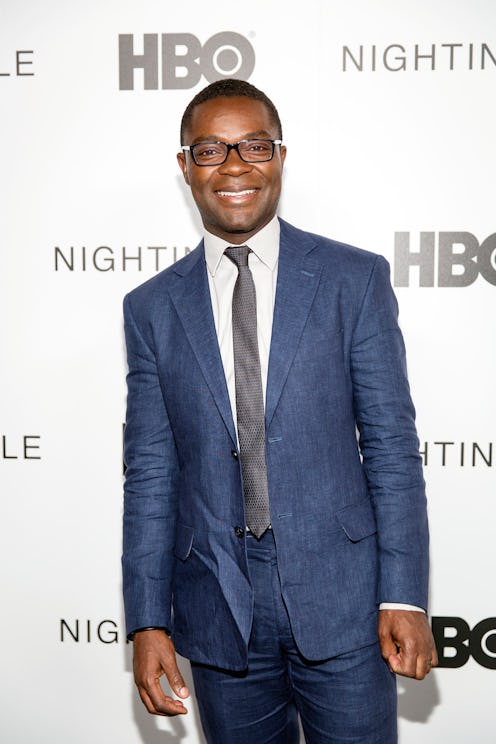
He's been in some of the most influential films in the last few years, and there's no slowing down for Nightingale star David Oyelowo. The actor, who has gone "method" for his newest role as an isolated man in the HBO film directed by Elliot Lester, has been in Lee Daniels' The Butler, Lincoln, and most recently Selma. Before Oyelowo was given the Nightingale script, he went to his agency and told them that he didn't want to be boxed in to roles that were only written for black characters. "I gave them that as a mandate," Oyelowo told an audience of young filmmakers and reporters at the Nightingale screening in New York City.
Oyelowo calls this "mandate" his Sidney Poitier speech. "Why did Sidney Poitier get to do what he did when he did?" he asked his agency. "So much of what I read that are written for black characters, are caricatures, stereotypes, the best friend, or they're token," Oyelowo says. "I'm not going to do that."
This conversation is what Oyelowo says was indicative of the thirst he had for certain roles in his career. "Come to me with what Michael Fassbender is turning down. Come to me with what Tom Hardy is turning down," he says he told his agency. About a week later, the Nightingale script was brought to him.
The film revolves around Peter Snowden, an unstable grocery store worker who lives with his mother and his computer camera, but spends his entire life in solitude. And, although Peter shares a home with his mother, she is vaguely (and mysteriously) absent from the entire film, much like all other characters. You only see one person throughout the film, Peter. No other bodies, only one or two other voices, and it's only filmed in or outside of his house. It's an examined look at mental health, isolation, sexual orientation, social media, and a descent into madness.
Lester, the director, says that he "didn't think of Peter Snowden as anything other than a human being." Race wasn't a question in this role, complementing the desire Oyelowo was looking for. Unfortunately, the film had a difficult time finding a home. It was entered into multiple festivals and couldn't find its footing. Distributors and festivals "didn't know what to do with [the film]," both Lester and Oyelowo say.
"I know for a fact that at certain festivals," Oyelowo says, "If I was a white, hot star, this would be programmed instantaneously, regardless of whether it worked as a film or not." The singular nature of the film screams independent film if I've ever seen one, so I was pretty shocked to hear Oyelowo say that it wasn't well-received by festivals.
"If you're an independent film festival... a film with one guy, in a house, on his own..." Oyelowo starts, before cutting himself off. "I love the film," he says, "But I think it's because I'm not a sportsman, I'm not a musician, [the film]'s not got anything to do with race, I'm not a gangster in it."
"'What do we do with this movie?'" he says, echoing what he thinks festival executives had to say. "And I know I'm right," he adds.
Luckily, the film found a home with Plan B, thanks to Jeremy Kleiner, Dede Gardner, and Brad Pitt — executives at the production company. After Selma's famous Oscar snubs, Pitt — who wasn't pleased with the Oscar announcements, according to Oyelowo — decided to watch Nightingale. Shortly there after the film that had no home, found one on HBO, and will finally be seen by the public when it premieres on Friday, May 29 at 9 p.m.
Images: Dorothy Hong (2)